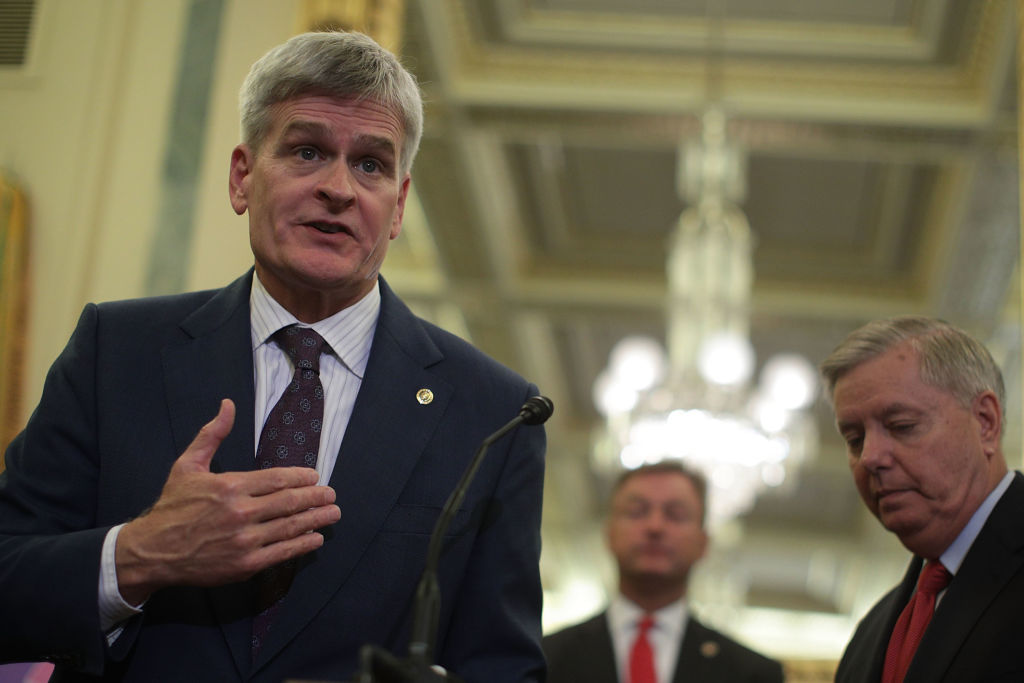Senate Republicans push forward on ObamaCare repeal despite lack of full CBO analysis

Sen. Rand Paul (R-Ky.) is a hard no on Graham-Cassidy, the last-ditch Senate Republican plan to gut the Affordable Care Act, and Sen. Susan Collins (R-Maine) is leaning no, but every other iffy Senate Republican appears on the fence, and GOP leaders emerged from a Monday night meeting cautiously optimistic. The 140-page bill, introduced by Sens. Bill Cassidy (R-La.), Lindsey Graham (R-S.C.), Ron Johnson (R-Wis.), and Dean Heller (R-Nev.), faces a Sept. 30 deadline if Republicans want to pass it with 50 votes, without Democrats.
The Congressional Budget Office (CBO) said it will have a preliminary analysis on the bill's fiscal impact next week, but won't have an estimate on how Graham-Cassidy would affect coverage numbers, premiums, or the federal deficit for "at least several weeks." Previous CBO scores of similar bills estimated that millions of Americans would lose coverage. "The odds are improving," Sen. John Thune (R-S.D.) said Monday night. "I told Bill Cassidy he's the grave robber. This thing was 6 feet under. And I think he's revived it to the point that there's a lot of positive buzz and forward momentum."
Sen. John McCain (R-Ariz.), who voted no when the last ObamaCare repeal vote fell short, said he wants to see a bipartisan bill debated in "a regular process rather than, 'Hey I've got an idea, let's run this through the Senate and give them an up-or-down vote.'" He's considered a maybe, and Sen. Orrin Hatch (R-Utah) announced that the Senate Finance Committee will hold one hearing on Graham-Cassidy on Monday, a move derided by the committee's ranking Democrat, Sen. Ron Wyden (Ore.), as "a sham process that makes a mockery of regular order."
The Week
Escape your echo chamber. Get the facts behind the news, plus analysis from multiple perspectives.

Sign up for The Week's Free Newsletters
From our morning news briefing to a weekly Good News Newsletter, get the best of The Week delivered directly to your inbox.
From our morning news briefing to a weekly Good News Newsletter, get the best of The Week delivered directly to your inbox.
Also opposing the bill is Louisiana Health Secretary Rebekah Gee, who reminded Cassidy that his namesake legislation "uniquely and disproportionately hurts Louisiana." The bill would end ObamaCare's Medicare expansion and subsidies, transferring much of those funds to states that did not expand Medicaid; Louisiana expanded Medicaid last year. The legislation would also give states wide latitude to end protections on people with pre-existing conditions and allow skimpier plans.
There's no guarantee the House would pass the bill, which it couldn't modify, but House Republicans would be under enormous pressure to do so. Meanwhile, a bipartisan health-care effort is being negotiated between Sen. Lamar Alexander (R-Tenn.) and Sen. Patty Murray (D-Wash.).
A free daily email with the biggest news stories of the day – and the best features from TheWeek.com
Peter has worked as a news and culture writer and editor at The Week since the site's launch in 2008. He covers politics, world affairs, religion and cultural currents. His journalism career began as a copy editor at a financial newswire and has included editorial positions at The New York Times Magazine, Facts on File, and Oregon State University.
-
 Washington grapples with ICE’s growing footprint — and future
Washington grapples with ICE’s growing footprint — and futureTALKING POINTS The deadly provocations of federal officers in Minnesota have put ICE back in the national spotlight
-
 ‘One day fentanyl will come back — and there will be little anyone can do’
‘One day fentanyl will come back — and there will be little anyone can do’Instant Opinion Opinion, comment and editorials of the day
-
 15 years after Fukushima, is Japan right to restart its reactors?
15 years after Fukushima, is Japan right to restart its reactors?Today’s Big Question Balancing safety fears against energy needs
-
 TikTok secures deal to remain in US
TikTok secures deal to remain in USSpeed Read ByteDance will form a US version of the popular video-sharing platform
-
 Unemployment rate ticks up amid fall job losses
Unemployment rate ticks up amid fall job lossesSpeed Read Data released by the Commerce Department indicates ‘one of the weakest American labor markets in years’
-
 US mints final penny after 232-year run
US mints final penny after 232-year runSpeed Read Production of the one-cent coin has ended
-
 Warner Bros. explores sale amid Paramount bids
Warner Bros. explores sale amid Paramount bidsSpeed Read The media giant, home to HBO and DC Studios, has received interest from multiple buying parties
-
 Gold tops $4K per ounce, signaling financial unease
Gold tops $4K per ounce, signaling financial uneaseSpeed Read Investors are worried about President Donald Trump’s trade war
-
 Electronic Arts to go private in record $55B deal
Electronic Arts to go private in record $55B dealspeed read The video game giant is behind ‘The Sims’ and ‘Madden NFL’
-
 New York court tosses Trump's $500M fraud fine
New York court tosses Trump's $500M fraud fineSpeed Read A divided appeals court threw out a hefty penalty against President Trump for fraudulently inflating his wealth
-
 Trump said to seek government stake in Intel
Trump said to seek government stake in IntelSpeed Read The president and Intel CEO Lip-Bu Tan reportedly discussed the proposal at a recent meeting
